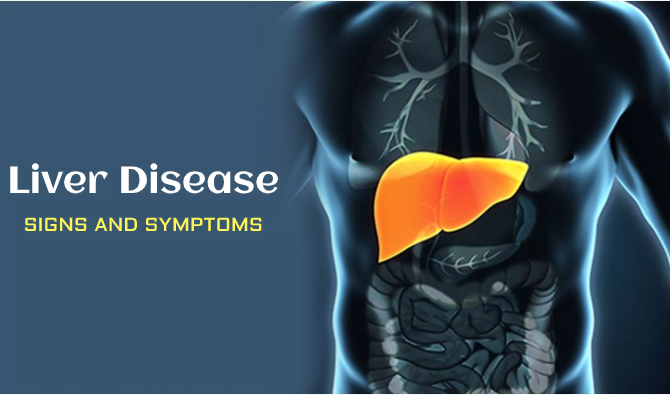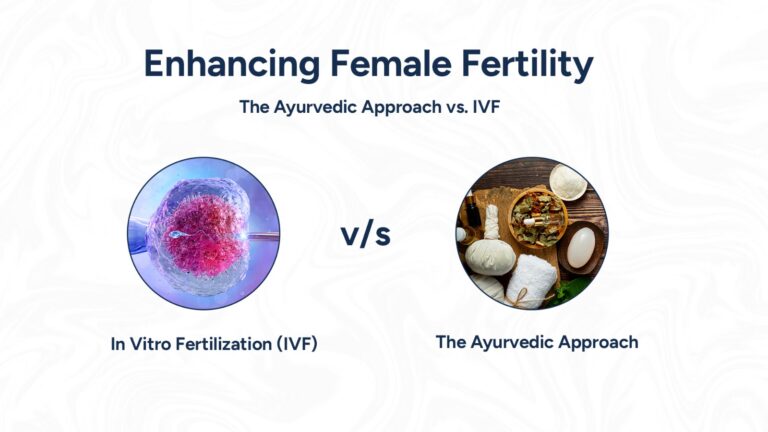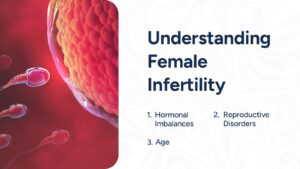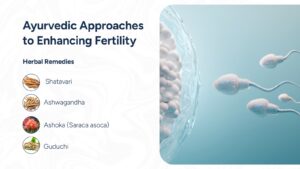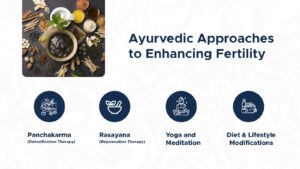Introduction
Childlessness or barrenness, whereby a woman cannot get pregnant or has not gotten pregnant for one year or more of trying, is a major issue to numerous women globally. They can be hormonal changes, reproductive issues, and conditions, age, and other diseases as well. The consequences of infertility are indeed multifaceted and have a terrible influence on one’s physical state, psychological state, and social standing.
Modern medicine offers solutions like In Vitro Fertilization (IVF), a technique where eggs and sperm are combined outside the body to assist conception. While IVF has helped many couples achieve pregnancy, it is not the only option. Ayurveda, an ancient Indian system of medicine, offers a different approach to fertility that focuses on natural remedies and lifestyle changes. This article explores how Ayurveda can be beneficial for female fertility and why, in some cases, it might be a preferable option compared to IVF.
Understanding Female Infertility
Female infertility can arise from various factors:Female infertility can arise from various factors:
Hormonal Imbalances: Some of the hormonal disorders include the Polycystic Ovary Syndrome (PCOS) and thyroid disorders that affect the normal hormonal cycle to facilitate problems such as ovulation and conception.
Reproductive Disorders: Conditions such as endometriosis, fibroids and blocked tubes can also affect the fertilization of the egg or implantation of the embryo.
Age: When a woman is of a certain age, the quality of the eggs as well as the quantity also reduces, thus making it a little difficult for a woman to get pregnant.
Infertility thus exerts multiple effects since it is a disorder experienced in various aspects of human life. Periodically, it can lead to various health problems and lead to complications with the menstrual cycle and pain. Self-employment on the other hand has negative impacts on its subjects emotionally, as they experience stressful, anxious and depressed moments. Personally, it can cause major relationship issues and extreme loneliness.
Ayurveda and Female Infertility
Ayurveda is actually a science of life which is one of the oldest medical systems of the world exercising the holistic technique of curing the ailments. It aims to balance the body’s three doshas: These are three Doshas which include Vata, Pitta, and Kapha. Each dosha represents a different aspect of bodily function and health:
- Vata: Associated with movement and change. Imbalances in Vata can lead to irregular menstrual cycles and reproductive issues.
- Pitta: Linked to transformation and metabolism. Excess Pitta can cause inflammation and hormonal imbalances.
- Kapha: Relates to structure and stability. Imbalances in Kapha may result in excess weight or fluid retention, affecting reproductive health.
Ayurveda views infertility as a sign of imbalance in one or more doshas. The goal is to restore balance through diet, lifestyle changes, and natural therapies.
Ayurvedic Approaches to Enhancing Fertility
1. Herbal Remedies
Shatavari
Shatavari (Asparagus racemosus) is acknowledged as one of the effective remedies used in Ayurveda for the treatment of women’s reproductive system disorder. Some of the positive impacts include; It creates hormonal balance, aids in improving the quality of the egg, and boosts fertility. Discover the benefits of Shatavari with Yukti Herbs’ capsules, crafted to support female health, increase energy, and improve overall wellness.
Ashwagandha
Ashwagandha is very popular and widely used in Ayurveda due to its anxiety-protective positive effects. By reducing stress, the vitality of the organ and sexual functioning is enhanced. Great! Here’s a simple and effective line for your article:
Boost your well-being with Yukti Herbs’ Ashwagandha capsules, designed to support stress management, enhance energy, and promote overall vitality.
Ashoka (Saraca asoca)
Some practitioners use Ashoka to support a healthy pregnancy by maintaining uterine tone and reducing the risk of complications.
Guduchi
Tinospora cordifolia is known to have detoxifying and immune building properties and this was given as Guduchi. However, in relation to reproductive health and wellbeing, it plays the role of helping to purify the body of toxins. Yukti Herbs GILOY CAPSULES are known for its rejuvenating properties and can help support overall health and balance Pitta dosha.
2. Panchakarma (Detoxification Therapy)
- Virechana (Purgation Therapy)
Purpose: To decrease Pitta dosha predominant in constitution and remove the toxins present in the gastrointestinal tract with the aid of herbal laxatives.
Fertility Benefits: Thus, severe Hormonal disorders and other reproductive dysfunctions may be said to be prevented due to the clearing of the toxins from the digestive system
brought about by the Virechana. It is useful in such difficulties as irregular menstruation and facilitates the process of purging.
- Basti (Enema Therapy)
Purpose: Often introduces some medicated oils or herbal decoctions into rectum for purging and nourishing the large intestine.
Fertility Benefits: Basti has the effect of countering Vata dosha in the body which is very important when it comes to the reproductive systems. It circulates blood to the area between the pelvis, increases nutrient intake of the lower abdominal region, and aids in flushing toxins from it. It is useful in cases of anovulatory cycles and chronic pelvic pain in female patients.
- Abhyanga (Oil Massage)
Purpose: This is a full body massage whereby medicated warm oil is spread all over the body all the way from head to the feet.
Fertility Benefits: Thus, Abhyanga has a therapeutic property to balance all the three doshas, that is – Vata, Pitta, and Kapha, good as circulatory system and decreases stress. It can assist in improving other health conditions and in having a healthy balance for reproduction.
- Shirodhara (Oil Dripping Therapy)
Purpose: Also entails applying warm oil on the forehead through a pouring process that should be steady.
Fertility Benefits:It soothes the nerves and combats stress, anxiety, and insomnia and is generally regarded to be ultimately revitalizing. To avoid interference of the hormonal balance and general reproductive health, proper management of stress should be done.
- Udvartana (Herbal Powder Massage)
Purpose: A massage with herbal powders to stimulate circulation and detoxify the body.
Fertility Benefits: Udvartana is useful to decrease the problem of Kapha dosha, proper digestion, and circulation of the blood in the body. This therapy may be useful in weight control and in the regulation of sexual issues.
- Kati Basti is one of the important Localized Oil Therapy which are found to be effective in curing various ailments.
Purpose: That warm oil is poured over the lower back in a dough ring.
Fertility Benefits: Kati Basti helps in the treatment of lower back pain, increasing blood circulation in the pelvic area and there are some cases where it is helpful in treating some diseases of the reproductive system like endometriosis and pelvic inflammatory disease.
- Yoni Pichu (Vaginal Oil Therapy)
Purpose: Yoni Pichu is done with the help of sterile cotton swab or ball and medicated oil ghee and this is put inside the vagina. This practice further aids in feeding and having an impact on the responses of dryness, inflammation and other aspects of reproductive health of the vagina.
Fertility Benefits: Yoni Pichu helps nourish the reproductive tissues, improve vaginal health, and balance hormonal functions. It is useful for treating dryness, infections, and other vaginal health issues.
- Uttarbasti: is an Ayurvedic therapy where medicated oils or decoctions are administered into the vaginal or urinary canal.
Fertility Benefits: It nourishes reproductive tissues, balances doshas, and detoxifies the organs, enhancing fertility. It addresses dryness, inflammation, and hormonal imbalances, promoting overall reproductive health and improving chances of conception.
3. Rasayana (Rejuvenation Therapy)
Purpose
Rasayana therapy mainly aimed at youthful physiology as well as the improvement of the vigor of the body. The goal of many of these treatments is to enhance the quality of the reproductive tissues and further well-being and fertility.
4. Yoga and Meditation
Stress Reduction
Yoga and meditation are parts of Ayurveda and useful in the case of stress. Daily practice enables the calming of the mind, skill in focusing and reduced anxiety. Certain asanas and Pranayama energize the reproductive system and try to increase circulation of blood which aids in fertility.
5. Diet and Lifestyle Modifications
Balanced Diet
Ayurveda emphasizes a diet that supports reproductive health and balances the doshas. Here are some key dietary recommendations:
- Fruits and Vegetables: Fresh, seasonal produce provides essential vitamins and minerals crucial for hormonal health.
- Whole Grains: Foods like quinoa, barley, and brown rice support overall vitality and help maintain a healthy weight.
- Healthy Fats: Incorporate ghee, nuts, and seeds into your diet, as they are important for hormone production and reproductive health.
Lifestyle Practices
Ayurveda also advocates for lifestyle changes that support fertility:
- Regular Sleep: Maintain a consistent sleep schedule to help regulate hormonal balance.
- Stress Management: Techniques such as meditation and yoga are recommended to reduce stress, which can positively affect fertility.
- Exercise: Engage in gentle, regular exercise to improve circulation and overall health without overstraining the body.
Comparing Ayurveda and IVF
1. Holistic vs. Technological Approaches
Ayurveda
Ayurveda practice is more effective because it targets the wholesomeness of an individual’s health, as well as encourages modification of the lifestyle and the use of natural products. Ayurveda gets to the root of infertility issues because it is the strong point of the therapy based on the doshas regulation and the overall well-being enhancement. This approach seeks to tackle the issue systematically and get to a stage where there are no symptoms for any ailment.
IVF
IVF is a technological intervention designed to assist conception by directly addressing issues such as fertilization and embryo implantation. While effective, it primarily focuses on the mechanical aspects of reproduction without necessarily addressing underlying health imbalances.
2. Benefits of Ayurveda
Personalized Care
Ayurveda provides treatments tailored to individual needs and imbalances. By addressing specific doshic imbalances and lifestyle factors, it offers a customized approach to improving fertility.
Long-Term Health
Ayurveda emphasizes overall well-being and long-term health improvements. Its focus extends beyond just fertility, promoting sustained health and balance.
Reduced Side Effects
Ayurvedic therapies and medicines are comparatively more harmless with negligible side effects than the hormonal drugs and surgeries incorporated in IVF.
Why Ayurveda May Be The Better Choice
While IVF has its advantages, Ayurveda can be considered a better option in certain aspects:
Holistic Health Focus
When compared to the other systems, Ayurveda is a whole system that works at the physical and psychological levels and is intended to achieve positive changes in an individual’s health. Perhaps, Ayurveda is more effective and can deliver long-term results due to its focus on the treatment of the main causes of infertility and improving the overall wellbeing.
Personalized Treatment
Ayurveda is patient centered which has to do with the dosha type and other peculiarities of a given patient. These are procedures which may make the results more neutral and long-lasting when the intervention is tailored to the individual’s learning style.
Natural and Gentle
Conventional medicines such as Ayurveda are comparatively non- invasive and employ herbal products to cure health disorders; the risks of such treatments may be comparatively lower than the hormonal treatments used in IVF.
Integrating Ayurveda with Modern Treatments
Ayurveda can complement IVF by preparing the body for the procedure and enhancing overall health. Combining Ayurvedic practices with IVF treatments can lead to a more holistic and integrative approach to fertility. Consulting both Ayurvedic practitioners and fertility specialists ensures a comprehensive approach to reproductive health.
Conclusion
It is an ageless science that aims at improving female fertility through natural solutions and the body, mind, and spirit integration. Whereas IVF uses technological aid to mention conception, Ayurveda offers an integrated solution to infertility taking consideration of the causes and overall well-being of the individual in the long run. It is useful for persons within the process to look at Ayurveda complementary or as a replacement for IVF. It is always advisable to get professional treatment from qualified doctors for the preparation to have children through developing suitable plans for enhancing reproductive health.
For those exploring ways to enhance fertility, Ayurveda offers a promising alternative or complement to IVF. Consulting with qualified Ayurvedic practitioners can provide tailored support to improve reproductive health. For more information, consider exploring resources and studies on the integration of Ayurveda and fertility treatments.



